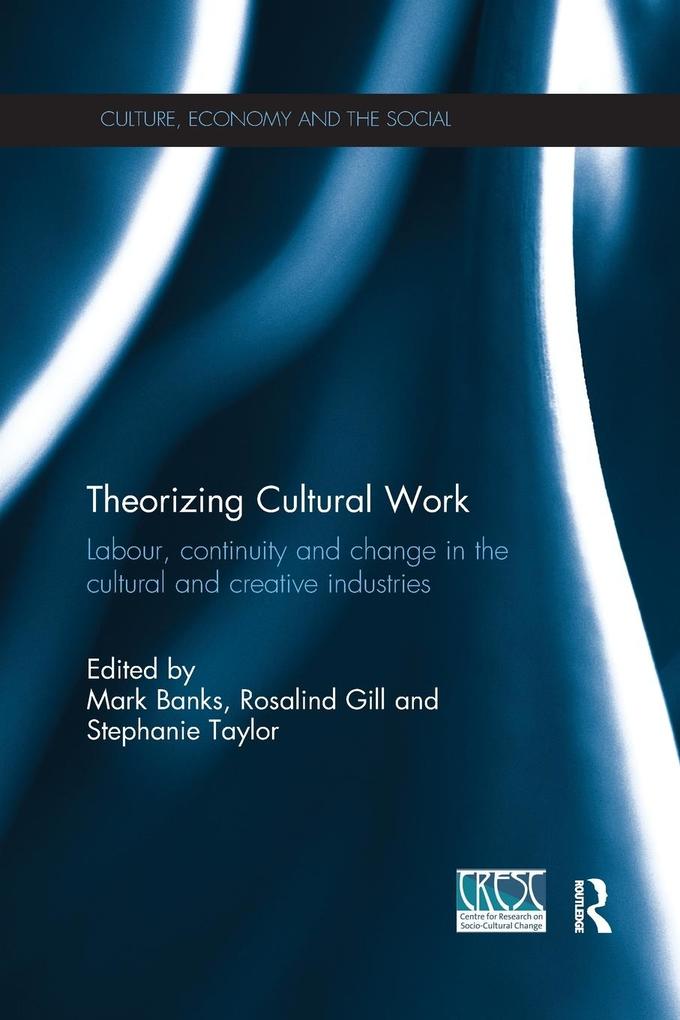
Zustellung: Di, 15.07. - Fr, 18.07.
Versand in 5 Tagen
VersandkostenfreiBestellen & in Filiale abholen:
Theorizing Cultural Work brings together leading theorists to reflect on the ways in which forms of cultural work are embedded historically and socially, and to assess the extent to which they are illustrative of some putatively new social relations of work. It analyzes both local and internationally inter-linked cultural/creative labour processes as they unfold across different territories and economic regimes, considering the history and the future of cultural work in light of the immediate (post-crisis) and longer term social context.
In recent years, cultural work has engaged the interest of scholars from a broad range of social science and humanities disciplines. The debate in this 'turn to cultural work' has largely been based around evaluating its advantages and disadvantages: its freedoms and its constraints, its informal but precarious nature, the inequalities within its global workforce, and the blurring of work-life boundaries leading to 'self-exploitation'.
While academic critics have persuasively challenged more optimistic accounts of 'converged' worlds of creative production, the critical debate on cultural work has itself leant heavily towards suggesting a profoundly new confluence of forces and effects. Theorizing Cultural Work instead views cultural work through a specifically historicized and temporal lens, to ask: what novelty can we actually attach to current conditions, and precisely what relation does cultural work have to social precedent? The contributors to this volume also explore current transformations and future(s) of work within the cultural and creative industries as they move into an uncertain future.
This book challenges more affirmative and proselytising industry and academic perspectives, and the pervasive cult of novelty that surrounds them, to locate cultural work as an historically and geographically situated process. It will be of interest to students and scholars of sociology, cultural studies, human geography, urban studies and industrial relations, as well as management and business studies, cultural and economic policy and development, government and planning.
Inhaltsverzeichnis
1. Introduction: Cultural Work, Time and Trajectory Part One: Histories 2. Precarious Labour Then and Now: The British Arts and Crafts Movement and Cultural Work Revisited 3. Cultural Work and Antisocial Psychology 4. Hired Hands, Liars, Schmucks: Histories of Screenwriting Work and Workers in Contemporary Screen Production 5. Absentee Workers: Representation and Participation in the Cultural Industries Part Two: Specificities/Transformations 6. Specificity, Ambivalence, and the Commodity Form of Creative Work 7. How Special? Cultural Work, Copyright, Politics 8. Logistics of Cultural Work 9. Learning from Luddites: Media Labor, Technology and Life Below the Line 10. Presence Bleed: Performing Professionalism Online Part Three: Futures 11. Feminist Futures of Cultural Work? Creativity, Gender and Difference in the Digital Media Sector 12. Creativity, Biography and the Time of Individualization 13. Professional Identity and Media Work 14. Theorizing Cultural Work: An Interview with the Editors. References.
Mehr aus dieser Reihe
Produktdetails
Erscheinungsdatum
18. Mai 2017
Sprache
englisch
Seitenanzahl
224
Reihe
CRESC
Herausgegeben von
Mark Banks, Rosalind Gill, Stephanie Taylor
Verlag/Hersteller
Produktart
kartoniert
Gewicht
348 g
Größe (L/B/H)
234/156/12 mm
ISBN
9781138087088
Entdecken Sie mehr
Bewertungen
0 Bewertungen
Es wurden noch keine Bewertungen abgegeben. Schreiben Sie die erste Bewertung zu "Theorizing Cultural Work" und helfen Sie damit anderen bei der Kaufentscheidung.

































